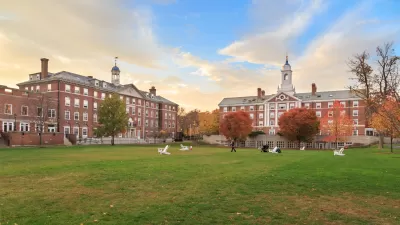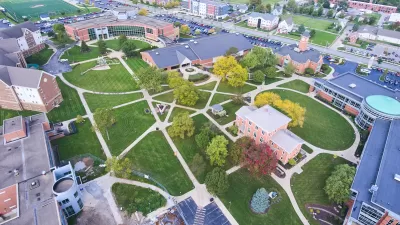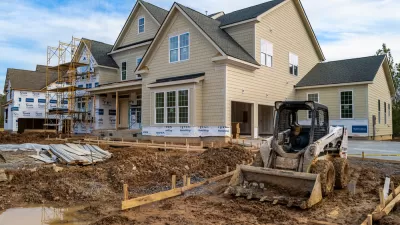Top universities are turning away thousands of eligible applicants, in part due to NIMBY resistance to building new student housing.

An opinion piece from Matthew Yglesias in Governing calls attention to the crisis facing U.S. colleges and universities that mirrors the nation’s larger housing crisis: too much demand, not enough supply.
According to David Deming, co-author of a new report on college admissions, “every year there are 30,000 to 35,000 students with scores of either 1550 (on the SAT) or 34 (on the ACT), but there are only 20,000 slots in these 12 [top] schools.”
For Yglesias, “There is a relatively simple way to reduce the tensions and build on one of America’s great national strengths: Make these schools larger.” And the biggest obstacle to doing so: NIMBYism.
As the article explains, elite universities often have trouble building new student housing near their campuses. “Thus the quintessential local issue of zoning squabbles ends up generating a national scarcity of elite college admissions slots, fueling zero-sum competition and ultimately reducing America’s ability to increase global ‘exports’ of its best-in-class high-end higher education product.”
Yglesias believes “state governments ought to take a larger role in land-use policy and overrule local stakeholders.” Universities and the engines of economic development they represent, Yglesias writes, are “too important to allow the people who happen to live close-by to have veto power over the whole thing.”
FULL STORY: America’s Colleges Are Also Facing a Housing Crisis

Alabama: Trump Terminates Settlements for Black Communities Harmed By Raw Sewage
Trump deemed the landmark civil rights agreement “illegal DEI and environmental justice policy.”

Planetizen Federal Action Tracker
A weekly monitor of how Trump’s orders and actions are impacting planners and planning in America.

The 120 Year Old Tiny Home Villages That Sheltered San Francisco’s Earthquake Refugees
More than a century ago, San Francisco mobilized to house thousands of residents displaced by the 1906 earthquake. Could their strategy offer a model for the present?

In Both Crashes and Crime, Public Transportation is Far Safer than Driving
Contrary to popular assumptions, public transportation has far lower crash and crime rates than automobile travel. For safer communities, improve and encourage transit travel.

Report: Zoning Reforms Should Complement Nashville’s Ambitious Transit Plan
Without reform, restrictive zoning codes will limit the impact of the city’s planned transit expansion and could exclude some of the residents who depend on transit the most.

Judge Orders Release of Frozen IRA, IIJA Funding
The decision is a victory for environmental groups who charged that freezing funds for critical infrastructure and disaster response programs caused “real and irreparable harm” to communities.
Urban Design for Planners 1: Software Tools
This six-course series explores essential urban design concepts using open source software and equips planners with the tools they need to participate fully in the urban design process.
Planning for Universal Design
Learn the tools for implementing Universal Design in planning regulations.
Clanton & Associates, Inc.
Jessamine County Fiscal Court
Institute for Housing and Urban Development Studies (IHS)
City of Grandview
Harvard GSD Executive Education
Toledo-Lucas County Plan Commissions
Salt Lake City
NYU Wagner Graduate School of Public Service





























